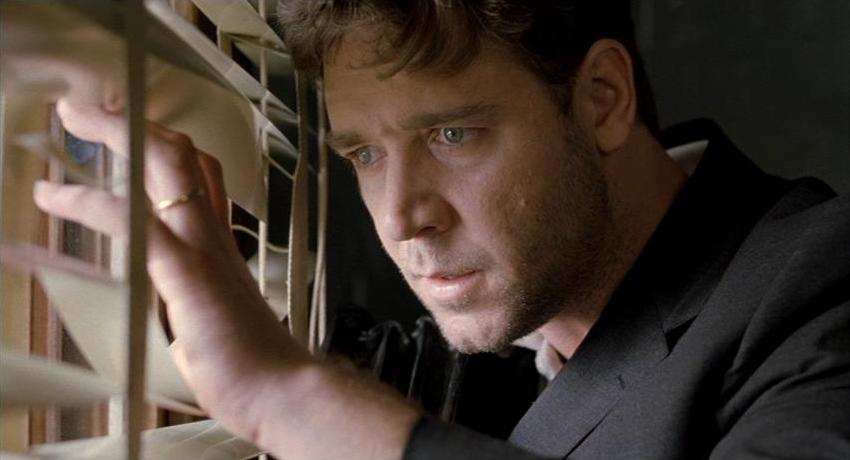
First Saw It:
January 4, 2002, at the Hoyts Pyramid Mall in Ithaca, NY
 |
Winner '01: First Saw It: |
A Beautiful Mind January 4, 2002, at the Hoyts Pyramid Mall in Ithaca, NY | ||
|---|---|---|---|---|
| Bridesmaids: | Gosford Park, In the Bedroom, The Lord of the Rings: The Fellowship of the Ring, Moulin Rouge! | |||
| My Vote: | The Fellowship of the Ring, just barely edging out Gosford Park | |||
| Overlooked: | Mulholland Drive, Amores perros, Ocean's Eleven, A.I. Artificial Intelligence |
 |
| Photo
© 2001 Universal Pictures/DreamWorks Pictures/ Imagine Entertainment |
| Academy Award Nominations and Winners: | |
| ★ | Best Picture |
| ★ | Best Director: Ron Howard |
| Best Actor: Russell Crowe | |
| ★ | Best Supporting Actress: Jennifer Connelly |
| ★ | Best Adapted Screenplay: Akiva Goldsman |
| Best Film Editing: Mike Hill and Daniel P. Hanley | |
| Best Original Score: James Horner | |
| Best Makeup: Greg Cannom and Colleen Callaghan | |
| Golden Globe Nominations and Winners: | |
| ★ | Best Picture (Drama) |
| Best Director: Ron Howard | |
| ★ | Best Actor (Drama): Russell Crowe |
| ★ | Best Supporting Actress: Jennifer Connelly |
| ★ | Best Screenplay: Akiva Goldsman |
| Best Original Score: James Horner | |
| Other Awards: | |
| Directors Guild of America: Best Director | |
| Screen Actors Guild Awards: Best Actor (Crowe) | |
| Writers Guild of America: Best Adapted Screenplay | |
| British Academy Awards (BAFTAs): Best Actor (Crowe); Best Supporting Actress (Connelly) | |
| Satellite Awards: Best Supporting Actress, Drama (Connelly); Best Original Song ("All Love Can Be") | |
| Permalink | Home | 2001 | ABC | Best Pics | Blog |